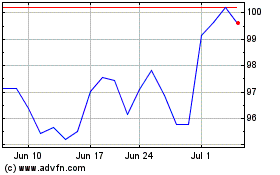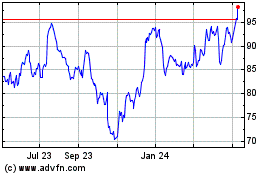By Corrie Driebusch
This article is being republished as part of our daily
reproduction of WSJ.com articles that also appeared in the U.S.
print edition of The Wall Street Journal (July 10, 2020).
Since the coronavirus pandemic began, companies looking to
bolster their balance sheets have rushed to sell stock in record
amounts. The result has been a resurgence in fees to Wall Street
banks in a high-margin area that had languished for years -- a
bounceback bankers and investors say could last through the
fall.
Thanks to a flood of new-stock issuance and a resilient IPO
market, companies raised nearly $190 billion from the end of March
through the end of June, the most ever in a single quarter for the
U.S. equity-capital markets, according to Dealogic, whose data go
back to 1995.
The wave started in the convertible-bond market as the Federal
Reserve gobbled up more bonds to help stimulate the economy. Then
it spread to large stock sales by publicly traded companies looking
to bolster their coffers as the virus threatened business. Those
successes emboldened other companies looking to raise money
opportunistically by selling stock. Then, in late May, initial
public offerings jolted back to life.
Last month, Warner Music Group Corp. and ZoomInfo Technologies
Inc. raised nearly $2 billion and more than $900 million,
respectively, in their IPOs, and Albertsons Cos. raised $800
million for its selling stockholders by going public. Soon, the
hedge-fund billionaire William Ackman is hoping to raise $3 billion
in a blank-check company IPO.
Secretive data company Palantir Technologies Inc. is considering
a late-summer or fall IPO, according to people familiar with the
matter. Food-delivery company DoorDash Inc. is expected to pursue
an IPO in the near future.
"We're in the face of a very resilient equity market which,
combined with economic uncertainty, has led to a period of
unprecedented equity issuance," said Jim Cooney, head of Americas
equity-capital markets at Bank of America Corp.
Wall Street has reaped billions in bank fees from such deals,
even as the financial world struggles to find its footing in an
economy rattled by the coronavirus pandemic. Equity-capital-markets
transactions brought in roughly $5.7 billion in fees in the first
half of the year, Dealogic estimates, a bounceback after several
years of languishing fees as fewer large companies tapped the IPO
market.
That was topped by the debt-capital markets, a lower-margin
business that had so much volume it brought in roughly $8.5 billion
in fees, according to Dealogic, as the Fed and other investors
bought a staggering amount of new bonds from U.S. companies.
In June, $17.2 billion was raised in IPOs, which tend to
generate the highest-margin fees for banks in equity-capital
markets. After a slow start to 2020, IPOs are poised to make up a
bigger portion of banks' fees for the rest of the year, said John
Chirico, co-head of North American banking, capital markets and
advisory at Citigroup Inc.
"IPOs are only a recent phenomenon. July this year to July next
year should look like a more normal year" in terms of mix, Mr.
Chirico said.
Bankers and investors say they expect the resurgence in stock
issuance to strengthen in the coming months.
The weeks after the Fourth of July holiday typically tend to
slow for IPOs, because it can be trickier to find time on analysts'
and fund managers' calendars. A slowdown this year is less likely,
as companies are wary of a second coronavirus wave that could halt
reopenings and further jolt the economy and stock market. Another
fear: the November presidential election and its potential to
surprise the market.
"As volatility comes down, you see the appetite of investors go
up," said Sonu Kalra, portfolio manager of Fidelity Blue Chip
Growth Fund at Fidelity Investments, who bought BlackRock Inc.
stock when PNC Financial Services Group Inc. sold its $13 billion
stake in May. "As long as volatility stays in this range, there
will be appetite. But if you see volatility spike, things could
quickly change."
Another reason the resurgence might continue is investors are
eager to buy stock at discounts to bolster their returns. The
bounceback in the stock market from March lows was largely led by
individual investors -- atypical of most rallies -- and it has
driven many large mutual and hedge funds to play catch-up, some
money managers said. One way to do that is to buy chunks of stock
in discounted follow-on offerings or IPOs.
"Institutional investors were late to the party this time. That
put a lot of pressure on [them] to participate with secondary
offerings or IPOs," said Rick de los Reyes, co-portfolio manager of
the T. Rowe Price Multi-Strategy Total Return Fund, which has
scooped up shares over the past few months through these types of
offerings.
In 2020, Goldman Sachs Group Inc., JPMorgan Chase & Co.,
Bank of America, Morgan Stanley and Citigroup have each done more
than $20 billion of equity-capital-markets deals through Tuesday,
whereas at the same point last year, no bank had eclipsed $16
billion, according to Dealogic.
Write to Corrie Driebusch at corrie.driebusch@wsj.com
(END) Dow Jones Newswires
July 10, 2020 02:47 ET (06:47 GMT)
Copyright (c) 2020 Dow Jones & Company, Inc.
Morgan Stanley (NYSE:MS)
Historical Stock Chart
From Mar 2024 to Apr 2024

Morgan Stanley (NYSE:MS)
Historical Stock Chart
From Apr 2023 to Apr 2024
